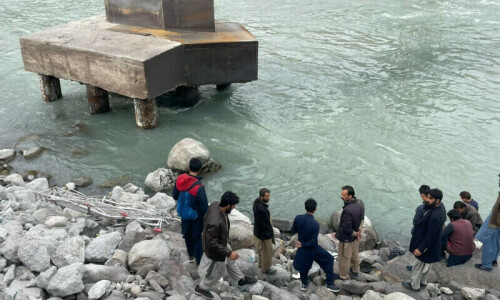MAO Zedong’s paper tigers have been sighted again, this time in Islamabad. Our paper parliamentarians growled menacingly, flicked their tails threateningly, and then surrendered their fearsome dentures to the military. They barked, but refused to bite.
Only the next two years — for that is the shelf-life printed on the 21st Amendment to the 1973 Constitution — will tell us if this latest experiment in shared judicial governance will succeed. Such liaisons, like mixed marriages, are by their very nature a constant trial. To succeed, they demand tact, patience and mutual accommodation.
Legislatures are dilatory by habit and conciliatory out of necessity; the military is authoritarian by definition and by training. If there is anything they share, it is subservience to the national interest. But even in that, each clings to its own perception of what constitutes the national interest, as every military coup or intervention since 1958 has demonstrated.
Imran has entered a more mature phase of his life.
The recent shotgun marriage between parliament and GHQ has a propitious parallel in the Khan nuptials at Bani Gala. The perennially debonair Imran Khan has married the glamorous, soignée Reham Khan.
For years, Imran Khan has been the ‘Krishna’ of Pakistani politics, the desirable bachelor who made every female gopi enamoured of him feel that he was there only for her. By finally marrying his ‘Rukmini’, though, he has entered into a newer, more mature phase of his life. He is on the road to ‘Dwarka’, its future ruler.
There is no one in the country who does not wish the Khan couple well. Their wedding ceremony — dignified, understated, its details selectively leaked, drop by secretive drop, to a press thirsty for news — is a portent of both the new Imran Khan and the new pragmatic Pakistan he has promised the nation.
The last wedding of such national significance took place 27 years ago, on Dec 18, 1987, when the late Benazir Bhutto married Asif Ali Zardari. To her possessive PPP loyalists, it was as if their Princess Charming was marrying Cinderfella.
She understood all too clearly the unique novelty of her situation. “I was always told by my elders that love comes after a marriage,” she explained. “In an arranged marriage, there is a mental commitment. You know that you are marrying somebody and he is going to be a part of your life forever.”
For Ms Bhutto, a conventional marriage brought predictable, mundane challenges. Unlike Reham who slipped seamlessly from being Ms Khan to Mrs Khan, Benazir was reluctant to drop her own name and adopt that of her husband.
According to Syeda Abida Hussain, whose extremely readable memoirs Power Failure have just been published, Ms Bhutto consulted her: “She asked me whether my children had bothered me when they were younger about their mother and father carrying different names.” Abida replied that her son had found the solution. Being the son of Syed Fakhar Imam and Syeda Abida Hussain, he declared himself Syed Abid Hussain Imam.
A more serious spectre in any marriage is fidelity. Benazir expressed her insecurity to Abida in a lengthy, informal tête-à-tête that lasted an uninterrupted eight hours.
Abida writes: “She asked me whether my husband had ever been unfaithful in our marriage. I told her that like any wife who had clocked thirty-five years with her spouse, I had certainly had my moments of suspicion, but in all fairness to Fakhar, there was nothing that could ever be seriously pinned on him.”
Abida continues: “Whereupon, Benazir said with ineffable sadness, that perhaps she had not been so fortunate, but she loved Asif very deeply, so she forgave him, even when he hurt her.”
Benazir complimented her confidante for having the best marriage in Pakistan’s politics, adding that she ‘envied’ her for it. Abida could not resist the retort: “In fact, she was the one who had the best marriage in politics; she made most of the errors and her husband was the one who went to jail [.] This explanation seemed to cheer her up.”
There will be little cheer in the ranks for the military or the parliamentarians during the next two years. As the Parisians have discovered, terrorists are the modern ghouls. They feast on death and eat on the run.
Initially, in every such attack, the scales are tipped in their favour. It took only three terrorists (two in the attack on the satirical magazine Charlie Hebdo and one on the Kosher supermarket) to hold over two million Parisians and 88,000 French security personnel hostage for almost three days.
France reacted by holding a peaceful march of remonstrance in which 3.7 million across the country participated. World leaders — Christians, Muslims, Jews and Gentiles — joined them, walking hand in hand. They challenged terror with their lives. They did not cheat democracy with the ‘cheaper bliss’ of constitutional amendments.
The writer is an author and art historian.
Published in Dawn, January 15th, 2015
On a mobile phone? Get the Dawn Mobile App: Apple Store | Google Play











































